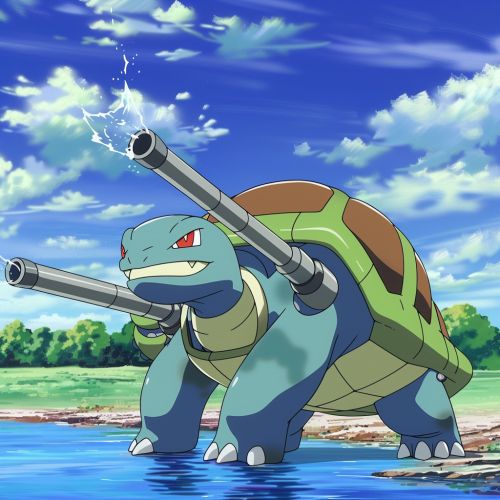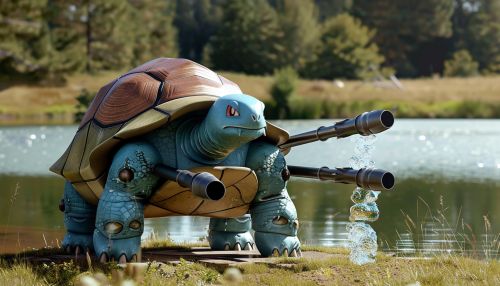Blastoise: Difference between revisions
(Created page with "== Introduction == Blastoise is a Water-type Pokémon species in Nintendo and Game Freak's Pokémon franchise. It evolves from Wartortle starting at level 36 and is the final form of Squirtle. Known for its powerful water cannons, Blastoise is a formidable opponent in battles and has been a popular choice among trainers since its introduction in the first generation of Pokémon games. == Biological Characteristics == Blastoise is a large, bipedal tortoise-like Pokémon...") |
No edit summary |
||
| Line 40: | Line 40: | ||
* [[Kanto Region]] | * [[Kanto Region]] | ||
[[Image:Detail-92971.jpg|thumb|center|Blastoise standing by a lake with water cannons extended.|class=only_on_mobile]] | |||
[[Image:Detail-92972.jpg|thumb|center|Blastoise standing by a lake with water cannons extended.|class=only_on_desktop]] | |||
[[Category:Pokémon species]] | [[Category:Pokémon species]] | ||
[[Category:Water-type Pokémon]] | [[Category:Water-type Pokémon]] | ||
[[Category:Kanto Pokémon]] | [[Category:Kanto Pokémon]] | ||
Latest revision as of 21:09, 21 June 2024
Introduction
Blastoise is a Water-type Pokémon species in Nintendo and Game Freak's Pokémon franchise. It evolves from Wartortle starting at level 36 and is the final form of Squirtle. Known for its powerful water cannons, Blastoise is a formidable opponent in battles and has been a popular choice among trainers since its introduction in the first generation of Pokémon games.
Biological Characteristics
Blastoise is a large, bipedal tortoise-like Pokémon with a blue body and a brown shell. The shell is equipped with two powerful water cannons that can shoot water with enough force to pierce steel. These cannons are retractable and can be aimed with great precision. Blastoise's body is robust and muscular, designed to withstand heavy impacts and deliver powerful physical attacks.
Anatomy and Physiology
Blastoise's anatomy is specially adapted for both defense and offense. Its shell is made of a hard, bony material that provides excellent protection against physical attacks. The water cannons are connected to a complex system of muscles and valves, allowing Blastoise to control the pressure and direction of the water jets. This system is supported by a highly developed cardiovascular system, which ensures a constant supply of water and nutrients to the cannons.
Evolutionary Biology
Blastoise evolves from Wartortle, which in turn evolves from Squirtle. This evolutionary line shows a gradual increase in size, strength, and complexity of the water cannons. The evolutionary process is believed to be driven by the need for more effective defense mechanisms and hunting strategies. The development of water cannons in Blastoise is a prime example of evolutionary adaptation in response to environmental pressures.
Habitat and Distribution
Blastoise is primarily found in freshwater habitats such as lakes, rivers, and ponds. It prefers clean, unpolluted water and is often seen basking on the shores or swimming near the surface. Blastoise is native to the Kanto region but can also be found in other regions through various means such as trade and migration.
Ecological Role
Blastoise plays a crucial role in its ecosystem as both a predator and a protector. Its powerful water jets are used to hunt smaller aquatic Pokémon and to defend its territory from intruders. Blastoise also helps maintain the cleanliness of its habitat by using its water cannons to remove debris and pollutants from the water.
Behavior and Social Structure
Blastoise is generally solitary but can be seen in pairs during the breeding season. It is highly territorial and will aggressively defend its home from any perceived threats. Blastoise communicates with other Pokémon through a series of vocalizations and body language, often using its water cannons to signal its intentions.
Reproduction
Blastoise reproduces by laying eggs, which are usually hidden in secluded areas near water. The eggs are guarded by the female until they hatch, after which the young Squirtle are left to fend for themselves. The breeding season typically occurs in the spring, when water temperatures are optimal for egg development.
Combat and Abilities
Blastoise is renowned for its combat abilities, particularly its use of water-based attacks. Its signature move, Hydro Pump, is one of the most powerful Water-type moves in the Pokémon series. Blastoise can also learn a variety of other moves, including Ice Beam, Earthquake, and Skull Bash, making it a versatile and formidable opponent in battles.
Training and Strategy
Trainers often focus on enhancing Blastoise's defensive and offensive capabilities. Due to its high defense and special attack stats, Blastoise is often used as a tank in battles, absorbing damage while dealing significant hits to opponents. Effective strategies include using moves like Protect and Toxic to wear down opponents while maintaining a defensive stance.
Cultural Significance
Blastoise has been a popular figure in Pokémon culture since its introduction. It has appeared in various forms of media, including the Pokémon anime, movies, and trading card game. Blastoise is often featured in promotional materials and merchandise, reflecting its status as one of the most iconic Pokémon in the franchise.
In Popular Media
Blastoise has made numerous appearances in the Pokémon anime, often as a powerful ally or formidable opponent. It has also been featured in several Pokémon movies, including "Pokémon: The First Movie" and "Pokémon: Detective Pikachu." In the Pokémon trading card game, Blastoise cards are highly sought after by collectors and players alike.
See Also


